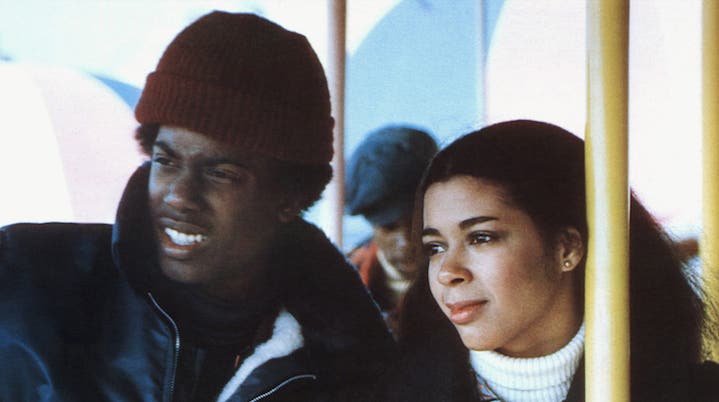
Aaron Loves Angela (USA, 1975) 99 min color DIR: Gordon Parks, Jr. SCR: Gerald Sanford. PROD: Robert Anderson, Morton J. Mitosky, Lloyd S. Gilmour Jr. MUSIC: José Feliciano. DOP: Richard C. Kratina. CAST: Moses Gunn, Kevin Hooks, Irene Cara, Robert Hooks. (Columbia Pictures)

From the director of Superfly comes this absorbing and properly downbeat Harlem-set Romeo and Juliet story. Aaron (Kevin Hooks) is a black teenager who is in love with Puerto Rican girl Angela (played by Irene Cara in her film debut). Despite their mutual attraction, little else in the movie could accurately be described as “sweet”. This is an honest film about racial tension and the socio-economic conditions that trap a lot of the characters within. Aaron’s father is a verbally abusive ex-basketball star who is pushing his son to own the paint, with or without his mutual ambition. (Kevin Hooks would also play a basketball player in the great TV series, The White Shadow.) Their scenes together are quite bristling. Also interesting is when a couple of Puerto Rican punks beat up Aaron for getting involved with “our women”, his form of retaliation is not the typical urban revenge clichés. Instead, he spray-paints the film’s title on a brick wall. There is a second major thread involving a black hustler who is putting together a huge drug deal after a large “dry spell”. The two stories converge with interesting consequences at the abandoned building in which Aaron and Angela also hide from everyone’s hostility towards their interracial coupling, and have their own little life together. The film does not dissolve into standard thriller clichés after that– once that drug deal goes sour, the story unravels in a novel way to reinforce how hard it is for people to escape their surroundings and pursue their dreams. The best moments are those in which Parks just points the camera, and the stars appear oblivious to being filmed at all; they talk like real people– stutters and overlapping dialogue abound. The music score by José Feliciano gives the picture its place and time. He also appears in a great scene in a club in which the bashful Aaron gets his friend to slip Angela a note (and a wonderful song is played).
